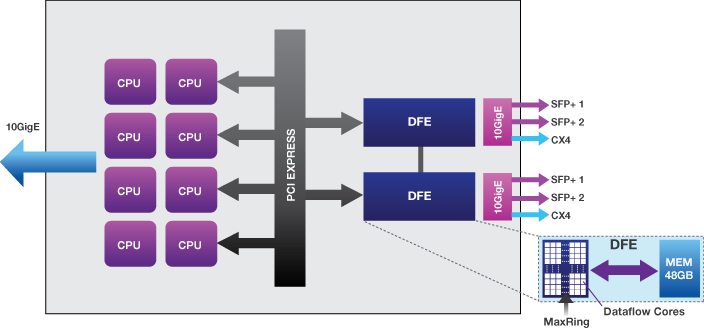

Series Features
- Integrated CPUs and DFEs
- DFEs support multiple 10Gbit data connections
and precision time synchronization - IPMI/Lights-out management support
- Fully programmable with MaxCompiler
MPC-N40
- Maximum density connectivity platform
- 1U form factor
- Up to 2x vectis dataflow engines,
each with 24GB of RAM - 2x SFP+ and 1x CX4 connections to each DFE
- 12 Intel Xeon CPU cores
- Up to 192GB CPU memory
- DFEs connect to CPUs via PCI Express gen2 x8
- 3x 3.5” disk drives
MPC-N42
- Expandable connectivity platform
- 2U form factor
- Up to 2x vectis dataflow engines,
each with 24GB of RAM - 2x SFP+ and 1x CX4 connections to each DFE
- 12 Intel Xeon CPU cores
- Up to 384GB CPU memory
- DFEs connect to CPUs via PCI Express gen2 x8
- 16x 2.5” disk drives
- Redundant power supplies
The Maxeler MPC-N series allows ultra low latency line-rate processing of multiple 10Gbit data streams.
The 1U node provides high-speed connectivity direct to dataflow engines. Up to 4 SFP/SFP+ ports and 2 CX4 ports support up to 6 high speed connections as well as additional inputs for operations such as time synchronization.
Maxeler DFEs provide the lowest possible latencies while supporting full line-rate processing, with single digit microsecond turnarounds for complex processing.
The MaxCompiler programming environment provides full support for the network interfaces, including ultra low latency protocol stacks for common network protocols on the dataflow engine and low-latency PCI Express data transfer to the CPUs.

MPC-N series node architecture
The MPC-N Series run production-standard Linux distributions, including Red Hat Enterprise Linux 5 and 6. The dataflow engine management software installs as a standard RPM package that includes all software necessary to utilize accelerated applications, including kernel device driver, status monitoring daemon and runtime libraries. All the management tools use standard methods for status and event logging and the nodes support the Intelligent Platform Management Interface (IPMI) for remote management.